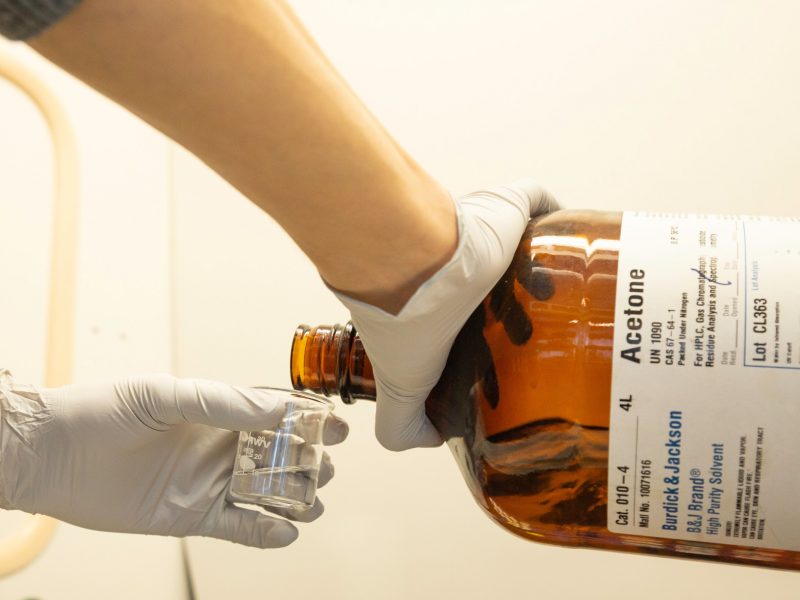Labs
Healthcare research labs at NAU
Research is a critical part of our work in the College of Health and Human Services. First-hand experience helps our students apply classroom lessons to the real world before graduation, establishing the foundation for a successful career. Faculty members from every department lead the way in theory and practice.
Adult Cognitive-Communication Laboratory
Key researcher: Dr. Emi Isaki
Housed in the Department of Communication Sciences and Disorders, the Adult Cognitive-Communication Laboratory explores the relationship between cognitive processes—such as attention, memory, executive function, and organization—and communication abilities.
Cell and Molecular Pathology Laboratory
Key researcher: Dr. O’Neil Guthrie
NAU’s Cell and Molecular Pathology Laboratory focuses on defining the cellular and molecular bases of diseases as a necessary prerequisite to the development of biomedical therapies. The laboratory employs strategies encompassing molecular biology, biochemistry, genetics, epigenetics, exploratory pharmacology, electrophysiology, microscopy, histopathology and cytology, and design-based stereology.
Child Speech and Language Laboratory (CSLL)
Key researcher: Dr. Anna Sosa
Housed in the Department of Communication Sciences and Disorders, the Child Speech and Language Lab studies early speech and language development in infants, toddlers, and preschoolers. The goal of the CSLL is to apply their research in providing better services for young children with speech-language delay and their families.
Fitness Assessment and Sport Training (FAST) Laboratory
Key researchers: Drs. Dierdra Bycura and Chris Repka
The FAST lab is both a teaching and research laboratory with equipment appropriate for conducting various fitness assessments and exercise interventions. The FAST lab supports ongoing research concerning the impact of specific modes of exercise for improvement of exercise performance and overall health. Additionally, this lab is involved in the validation of exercise testing protocols.
We also house equipment used for exercise testing, exercise program design, and sport-specific training. Equipment within this laboratory includes, but is not limited to, treadmills, cycle ergometers, CompuTrainer bike system, Veletron, skinfold calipers, blood pressure cuffs and stethoscopes, free weights, handgrip dynamometer, and a Vertec vertical jump tester.
Healthy Eating and Active Living (HEAL) Laboratory
Key researchers: Drs. Tim Behrens, Priscilla Sanderson, and Dirk de Heer
The HEAL Lab centers on community-based evaluation efforts, largely focused on HEAL initiatives, but also working with many different health outcomes. The work of the HEAL Lab is primarily with low-resource communities, expanding health for all those we serve. Examples of current efforts include evaluation collaboration with the Navajo Nation (Navajo Department of Health, Navajo Epidemiology Center, Division of Community Development, and other partners), COPE–Gallup, Northern Arizona Healthcare and Fit Kids of Arizona, and more. HEAL Lab work is funded through federal, philanthropic, and collaborative supports.
Human Movement Laboratory
The Human Movement Lab is a 1200 square foot space in Room B 208 of the Health Science Education Building in the Phoenix Bioscience Core. In the lab, we measure functional performance, biomechanics, and physiological processes associated with movement and exercise. Research equipment includes a motion analysis system (8 camera Vicon system, AMTI force plate with a portable walkway, and Noraxon wireless 12 lead EMG), Woodway treadmill, stationary bike, metabolic cart, GAITRite and LiteGait systems, Neurocom, and various pieces of equipment for resistance exercise.
Laboratory for Exercise and Nutrition (LEAN)
Key researchers: Drs. Jay Sutliffe, Chris Repka, and Dierdra Bycura
The LEAN lab is a facility with state-of-the-art equipment to evaluate various components of body composition for diet analysis and nutrition education, including lean body mass, fat mass, bone mineral density, hydration status, blood glucose, and blood lipid data. We also support ongoing research in nutrition evaluation and education, exercise intervention, and body composition analysis. Equipment within this laboratory includes, but is not limited to, GE Hologic Dual Energy X-ray Absorptiometry machine, COSMED “Quark CPET” Metabolic cart, SECA, HbA1C blood analyzers, Cholestech LDX Analyzers, and food models for dietary analysis and education.
Motivational Interviewing Training (MIT) Laboratory
Key researchers: Dr. Dawn Clifford
The MIT lab is a teaching and research lab aimed at training students in health professions to become more effective at supporting patients and clients through behavior change processes and researching the effectiveness of innovative motivational interviewing training techniques. The lab space provides students with a comfortable and confidential space to conduct health coaching sessions, along with equipment for supervision and feedback. The MIT lab supports the health coaching training needs of community partners in Northern Arizona through training students for employment and supporting their employee training needs.
Plant Rich and Nutrient Dense Interventions for Active Lifestyles (PRANDIAL) Laboratory
Key researchers: Dr. Jay Sutliffe and Julia Scheid
The diverse team of educators, clinicians, researchers, and students involved with the PRANDIAL Lab seek to better understand the mechanisms and dynamics involved in the relationship among nutrition, behaviors, cultural influences, and sustainable lifestyle practices. Our projects are local, regional, and nationwide. We partner with professionals from academia, medicine, health departments, healthcare systems, behavioral health, and the broad field of wellness, in an effort to facilitate optimum living across the lifespan with a primary focus on nutrition and foods.
